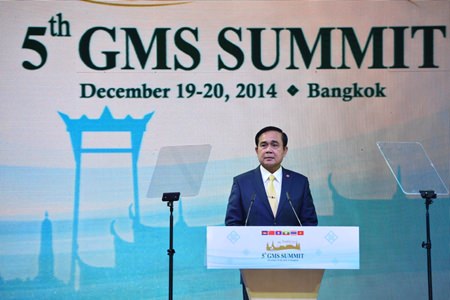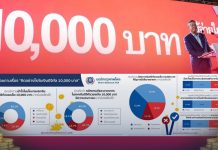Prime Minister Gen Prayut Chan-o-cha on Saturday, Dec. 20, proposed a 10-year development plan comprising seven strategies for developing countries lying along the Mekong River basin.
His proposal was made during the 5th Greater Mekong Subregion (GMS) Summit at a Bangkok hotel and attended by more than 500 senior officials and government leaders, including Hun Sen of Cambodia, Li Keqiang of China, Thongsing Thammavong of Laos, Vietnamese Prime Minister Nguyen Tan Dung and President Thein Sein of Myanmar.
Takehiko Naka, president of the Asian Development Bank (ADB), was also in attendance.
Gen Prayut said while delivering the opening remarks of the session that countries lying along the river basin could build connectivity, strengthening competitiveness and communities in the region under a 10-year joint cooperation, from 2012 to 2022, with combined investment of US$30 billion which would follow seven strategies that had been laid out.
 Prime Minister Gen Prayut Chan-o-cha addresses the Greater Mekong Subregion Summit in Bangkok.
Prime Minister Gen Prayut Chan-o-cha addresses the Greater Mekong Subregion Summit in Bangkok.
The seven strategies include optimum utilization of goods transportation connectivity along the economic corridor, further development of land and marine logistics, deduction of guidelines on border crossing, development of energy resources, fund mobilization to support investment plans of countries in the region, an adjustment of benefits and an investment by the private sector and joint cooperation in overseeing the environment and management of natural disaster.
Prime Minister Hun Sen said countries in the region should provide more support to economic corridor program as it would create benefits to them.
The private sector should be invited to partner in the program as it could help create a niche market, new jobs and reduce social disparity.
Hun Sen said GMS member nations should receive financial support from ADB as it could help foster innovations and assist members of the Association of Southeast Asian Nations (ASEAN) on a sustainable basis.
Stressing that China is prepared to cooperate and promote development of countries in the region, Chinese Prime Minister Li said his country would contribute one billion yuan to the sub regional connectivity program and another 3 billion yuan to each member country to spend on transportation development.
Laos Prime Minister Thongsing called on GMS members to help poorer countries and for financial institutions to assist in developing the transportation sector, airports and public health infrastructure so that they could meet international standards.
Thein Sein, president of Myanmar, said progress of GMS members must be derived from connectivity while there was still a transportation gap at present.
He said Myanmar has opened the country wider in order to connect with ASEAN, and the country hopes for more cooperation from GMS members to help solve other problems prevailing in the region such as natural disasters, human and drug trafficking, and transnational crime.
Vietnamese Prime Minister Dung said that his country is willing to extend cooperation and promote economic development as well as human development and the environment, as they could lead to changes in the region.
He urged every member to prepare a joint GMS operational plan and stressed that members must all be responsible for water flowing in the Mekong River.
Nakao, president of ADB, said his bank is prepared to extend US$30 billion for 80 projects and academics to further develop GMS countries.
He said GMS members are heading down the right path in strengthening the connectivity program within the region.




